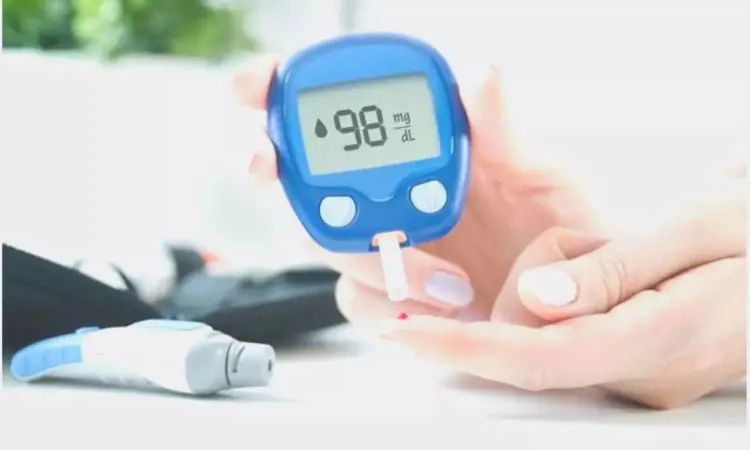- Home
- Medical news & Guidelines
- Anesthesiology
- Cardiology and CTVS
- Critical Care
- Dentistry
- Dermatology
- Diabetes and Endocrinology
- ENT
- Gastroenterology
- Medicine
- Nephrology
- Neurology
- Obstretics-Gynaecology
- Oncology
- Ophthalmology
- Orthopaedics
- Pediatrics-Neonatology
- Psychiatry
- Pulmonology
- Radiology
- Surgery
- Urology
- Laboratory Medicine
- Diet
- Nursing
- Paramedical
- Physiotherapy
- Health news
- Fact Check
- Bone Health Fact Check
- Brain Health Fact Check
- Cancer Related Fact Check
- Child Care Fact Check
- Dental and oral health fact check
- Diabetes and metabolic health fact check
- Diet and Nutrition Fact Check
- Eye and ENT Care Fact Check
- Fitness fact check
- Gut health fact check
- Heart health fact check
- Kidney health fact check
- Medical education fact check
- Men's health fact check
- Respiratory fact check
- Skin and hair care fact check
- Vaccine and Immunization fact check
- Women's health fact check
- AYUSH
- State News
- Andaman and Nicobar Islands
- Andhra Pradesh
- Arunachal Pradesh
- Assam
- Bihar
- Chandigarh
- Chattisgarh
- Dadra and Nagar Haveli
- Daman and Diu
- Delhi
- Goa
- Gujarat
- Haryana
- Himachal Pradesh
- Jammu & Kashmir
- Jharkhand
- Karnataka
- Kerala
- Ladakh
- Lakshadweep
- Madhya Pradesh
- Maharashtra
- Manipur
- Meghalaya
- Mizoram
- Nagaland
- Odisha
- Puducherry
- Punjab
- Rajasthan
- Sikkim
- Tamil Nadu
- Telangana
- Tripura
- Uttar Pradesh
- Uttrakhand
- West Bengal
- Medical Education
- Industry
Stress hyperglycemia ratio predicts high thrombus burden in patients with acute coronary syndrome

Turkey: A recent study published in the SAGE journal Angiology has shown that stress hyperglycemia ratio (SHR) predicts thrombus burden in patients with acute coronary syndrome (ACS). SHR showed higher sensitivity than admission glucose level.
Previous studies have shown that In STEMI (ST-segment elevation myocardial infarction) patients, significant intracoronary thrombus burden independently predicts adverse cardiac outcomes and is linked with an increased risk of unsuccessful angiographic reperfusion and distal embolization during primary PCI (percutaneous coronary intervention). The early recognition and suitable treatment of thrombus burden may contribute to STEMI management.
In AMI (acute myocardial infarction) patients, admission hyperglycemia is common and is independently associated with poor prognosis, especially in diabetes patients. This stresses the importance of an acute glycemic rise by stress hyperglycemia rather than glucose levels at hospital admission. In clinical practice, admission glycemia has been used as an index of stress hyperglycemia; however, it cannot reflect the "true" acute glycemic increase in diabetic patients with chronic elevation of glucose levels.
The stress hyperglycemia ratio is calculated by combining acute (admission glucose level) and chronic [estimated by glycosylated haemoglobin (HbA1c)] glycemic values. It is proposed as a novel index of stress hyperglycemia.
Against the above background, Engin Algül, Diskapi Yildirim Beyazit Education and Research Hospital, Ankara, Turkey, and colleagues aimed to measure the predictive value of the stress hyperglycemia ratio, an indicator of stress hyperglycemia, showing increased thrombus burden in ACS patients.
In the cross-sectional study, the authors enrolled 1222 patients with ACS. Coronary thrombus burden was categorized as low and high. The stress hyperglycemia ratio was calculated by dividing the admission serum glucose by the HbA1c-derived estimated average glucose. In 771 patients, a low thrombus burden was detected, while a high thrombus burden (HTB) was detected in 451 patients.
The study led to the following findings:
- The stress hyperglycemia ratio was significantly higher in patients with high thrombus burden (1.1 ± .3 vs 1.06 ± .4).
- SHR was determined as a predictor of high thrombus burden (odds ratio (OR) 1.547) due to univariate analysis.
- According to multivariate analysis, SHR was defined as an independent risk factor for HTB (OR 1.328).
"Our findings showed that stress hyperglycemia ratio predicted thrombus burden with higher sensitivity than admission glucose level in patients with acute coronary syndrome," the authors concluded.
Reference:
Algül E, Özbeyaz NB, Şahan HF, Aydınyılmaz F, Sunman H, Tulmaç M. Stress Hyperglycemia Ratio Is Associated With High Thrombus Burden in Patients With Acute Coronary Syndrome. Angiology. 2023;0(0). doi:10.1177/00033197231167054
Dr Kamal Kant Kohli-MBBS, DTCD- a chest specialist with more than 30 years of practice and a flair for writing clinical articles, Dr Kamal Kant Kohli joined Medical Dialogues as a Chief Editor of Medical News. Besides writing articles, as an editor, he proofreads and verifies all the medical content published on Medical Dialogues including those coming from journals, studies,medical conferences,guidelines etc. Email: drkohli@medicaldialogues.in. Contact no. 011-43720751


